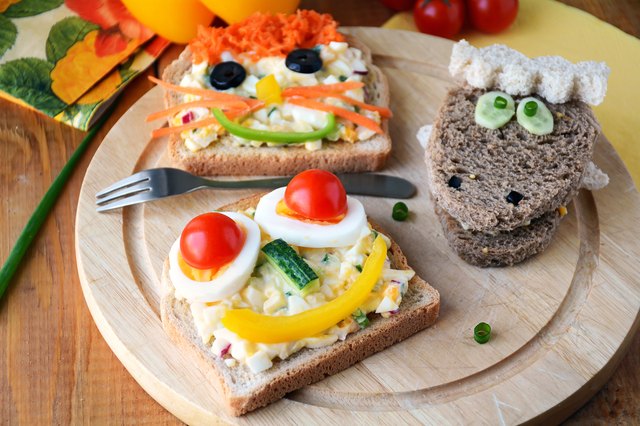If you like, blame the big bang theory or Mark Zuckerberg's fortune, but being smart is cool. Popular cultural and scientific implications for the brain development of infants and children have inspired a strong interest in shaping children into smarter and more capable adults. There are six research supported approaches to this goal. Credit: Credit: Credit: Credit: Credit: Credit: Sponsored Links has proved that mothers who consume more than 200 grams of fatty fish (such as salmon, trout and sardines) every week during pregnancy have neuropsychological and cognitive benefits. Two hundred grams is about seven ounces (the size of two playing cards), so two meals of fish a week is enough. If vegan or vegan mothers never eat fish or use fish oil supplements during pregnancy, they may consider using seaweed oil capsules because fish eat seaweed containing omega-3 fatty acids and accumulate in the body over time. However, it should be noted that several studies of pregnant women taking fish oil supplements have shown no differences in their children's cognitive development. Now, the evidence suggests that it's fish meat, not just fish oil, that contains the magic ingredients needed to make children smarter. Of course, pregnant women should avoid eating mackerel, tuna and swordfish, because their high mercury content will actually damage the nerve development of sensitive fetal brain tissue. correlation: is omega-3 worth the money? Yes! credit card: Sergey bruning / iStock / Getty Images correlation: best nutrition advice for ADHD children: nosik / Istok / Getty Images. Create an environment of security and dramatic freedom. Toxic stress is now thought to stunt brain development in children and is thought to be a negative exposure (for example, exposing your child to smoking). The more stress a child experiences - whether it's greater trauma such as divorce or loss of parents, or longer-term problems such as marital discord or economic insecurity - the more at-risk the child's brain is. Parents should stay away from their children's stressful arguments and carefully consider the consequences before taking them to violent events like political protests. According to Nancy Cambria, a reporter for the St. Louis post, children under the age of seven may block the details of stress and trauma, but they may still retain the strong emotions they felt during that time. After the incident in Ferguson, Missouri, Cumbria extensively studied the impact of gun violence on children. This affects their future resilience, trust and social relationships, as well as executive function (higher level brain problem solving). correlation: 11 yoga postures can eliminate the stress of a day. Credit: vstock LLC / vstock / Getty Images related: clean food in restaurants, together with children at home correlation: American Lung Association's 2016 air condition report working memory is a type of "daily life" memory, which is used to remember from a grocery list to the 8th problem that you must return to, and solve the 24th problem on the SAT. It is one of the core executive functions, which is necessary, because the human brain can only focus on the fourth problem. One at a time. A Chinese study of pupils trained in abacus mental arithmetic shows that such training not only helps with mathematics, but also helps with working memory. Advertisements correlation: how our brains learn and why we forget things. Credit: to what extent would you like to provide your child with intellectual advantages? Do you strive for a better environment for your children, such as promoting clean air programs for government officials? Can you plan a delicious meal for your children? Or will overwork keep you from going too far at home? Please let us know in the comments! Advertisements correlation: the eight most beneficial activities for the brain
2. Make sure the children have breakfast. The positive effect of breakfast on cognitive ability has been confirmed in high-risk children, who may be more limited in the types of food they can afford. But that doesn't mean rich kids should ignore the positive impact - breakfast certainly doesn't hurt. Parents should try to combine some protein and fat, such as a boiled egg or almond butter on wholemeal bread, to prevent the sugar from collapsing in the second math class and keep their children energetic throughout the morning.
4. Limit residential activities and other life disturbances. Moving at home is also one of the most stressful events for children. A study published in the American Journal of Preventive Medicine found that frequent family upheavals in the early / middle years of adolescence were associated with increased rates of violent crime, attempted suicide, drug abuse and unnatural death. The study recommends vigilance for relocated adolescents and their families, including "close cooperation between multiple public institutions, in particular children, adolescents and adult mental health services."
5. Choose a house away from air pollution. A study in Mexico City found that children living in non polluted areas performed better on cognitive tests than children living in polluted areas. More than half of the children in the study showed inflammation in the brain. The researchers also autopsied the brains of dogs from contaminated areas and found particles and inflammatory spots in the brain, similar to those found in children. You can find your community in the American Lung Association's air condition report, or check the air pollution report of your surrounding community with your city or county government.
6. Hone children's working memory.

What do you think?






How to cultivate a smart child
Advertisements



Comments